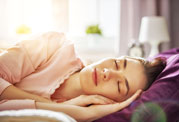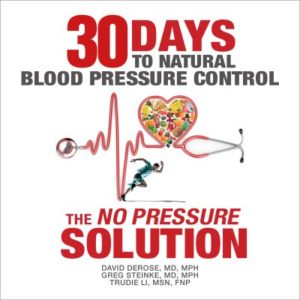Non-Drug Help for Insomnia
David J. DeRose, MD, MPH
As presented on the Three Angels Broadcasting Network’s Health for a Lifetime
Taped December 2005
Note: This material is designed to inform and educate. It represents the opinions of the author based on his understanding of current medical research and is not intended to be viewed as a replacement for medical evaluation, advice, diagnosis, or treatment. Because medicine is a constantly changing science that requires professional evaluation, neither the author nor the distributors of this material can take responsibility for any adverse consequences resulting from the application of this information. If the material in this handout disagrees with personalized information provided by your health care professionals, please follow the counsel of those health care providers—not this article.
Background
Although many people suffer from acute insomnia (short-term difficulty sleeping that lasts between one and thirty days), a variety of studies suggest that between 10 and 20 percent of the U.S. population suffer from chronic insomnia (persistent trouble sleeping—at least three nights per week for one or more months).
The causes of sleeplessness can be simplistically divided into primary and secondary insomnia. Primary insomnia occurs for no obvious social, mental, or physical reason. On the other hand, secondary insomnia occurs due to the direct result of some identifiable process. Causes of secondary insomnia include stress, poor lifestyle habits, mental health problems (such as anxiety or depression), drug side effects, damage to the brain’s built-in “biologic clock” (resulting from things like stroke or Alzheimer’s disease), and other medical conditions (including sleep apnea, restless legs syndrome, chronic pain, and hot flashes).
The ideal treatment for secondary insomnia involves addressing the underlying cause or causes. However, even if these underlying causes have not been fully identified or addressed, lifestyle changes can often dramatically improve sleep quality. The same holds true for primary insomnia: although a doctor may not identify a cause for your sleeplessness, lifestyle changes still may significantly improve your sleep.
Therefore, if you have trouble sleeping make sure you get a full medical evaluation searching for treatable causes of insomnia. Additionally, consider the following non-drug strategies that may help improve sleep quality:
1.Develop a bed-time routine. This allows your body to “wind down.” Try spending the last 30 to 60 minutes of your day engaged in activities that promote relaxation: avoid thoughts about stress-producing topics (perhaps skip the nighttime news), engage in pleasant social interaction, take a relaxing bath or shower, or enjoy inspirational reading or music. Your body unwinds most effectively if you get to bed and arise at roughly the same time every day of the week (yes, this includes weekends). Also try to adhere to the same schedule when traveling.
2.Beware of late night meals. Although a late night snack may help induce sleep, it can also interfere with sleep quality. If your blood sugar is rising at bedtime it can suppresses production of normal restorative hormones like melatonin and growth hormone. Therefore, it is generally best to avoid eating for at least several hours before bedtime.
3.Optimize daytime light exposure. If you have problems waking up in the middle of the night and are unable to fall back to sleep, consider getting more exposure to sunlight in the early evening. This can help to resynchronize your body clock. If you can’t get outside, try using bright light therapy. This requires a special light that is rated to deliver light at an intensity of 3,000 to 10,000 lux for 30 minutes. If your problem is not being tired enough at bedtime, get your bright light exposure between 6 and 8 in the morning.
4.Ensure a more optimal sleep environment. Most people sleep best in a room that is cool (but not too cold), dark, comfortable, and quiet. Either make changes in the room or employ other strategies to ensure a more favorable environment. This may include using heavier shades, getting rid of night lights, or wearing a sleep mask at night. Consider the use of ear plugs if noise is a problem. Alternately, “white noise” like the sound of a fan, a tape of natural sounds (waves crashing on a seashore, the hum of crickets and other night creatures, etc.) or a radio dial set to a non-station can be used to drown out disruptive noises.
Individuals troubled by back pain can decrease stress on their backs by using a pillow to help them sleep with their knees bent. Put a large pillow under your knees if you are lying on your back. Put the pillow between your legs if lying on your side. A small cylindrical pillow or “lumbar roll” under the small of your back can be a tremendous help if you are a back sleeper.
5.Avoid unnecessary stimulant drugs. Stimulants interfere with the ability to sleep. Two common culprits are caffeine and nicotine. Even caffeine taken relative early in the day can have effects on nighttime sleep quality. If you feel you must drink caffeine, by all means avoid any intake after noon.
Furthermore, stimulants may be found in unsuspected places. Appetite suppressants may contain stimulant drugs. Many asthma drugs also have stimulant properties. On the other hand, many cold and allergy preparations contain antihistamines that can help induce sleepiness; however, they may also include decongestants possessing stimulant properties. Consult with your doctor if you think a prescription drug is contributing to sleeplessness—don’t make any changes yourself or you may produce greater problems than insomnia (this is especially true with asthma medication changes).
6.Avoid alcohol. Alcoholic beverages may make you feel drowsy, but they actually interfere with sleep quality. Say “no” to alcohol if you want to increase the value of the time you spend in bed.
7.Watch out for other medications that disrupt sleep. Diuretics (“water pills”), especially if taken late in the day, can disrupt sleep through increasing nighttime trips to the bathroom. However, again, do not make any medication changes without your doctor’s approval. Even a bedtime dose of diuretics may be less disruptive to sleep than significant fluid build-up in one’s lungs due to under-treated pulmonary edema (“water in the lungs”).
8.Don’t use your bed for normal waking activities. Avoid reading, watching TV, eating, or performing other normal waking activities in your bed. This may create an association in your brain between your bed and wakefulness.
9.Consider putting six inch blocks under the legs at the head of your bed. Even if you don’t notice symptoms of heartburn, acid traveling from your stomach back up into your swallowing tube or esophagus (technically called “reflux”) can interfere with sleep quality. One way this occurs is by adversely impacting lung function either directly (by acid traveling into your airways) or indirectly (through reflex mechanisms). Sleep quality can also suffer due to symptoms of heart burn or acid triggering voice box spasm. Elevating the head of the bed with blocks decreases the likelihood of reflux problems (using more pillows is not an adequate substitute). Other reflux decreasing strategies include not eating for several hours before bedtime, avoiding tight fitting garments, and losing weight (if overweight).
10. Get adequate exercise during the day. Physical exercise during the day often helps promote more restful sleep. However, vigorous exercise before going to bed may interfere with sleep by causing undue stimulation. Such is not the case with less intense exercise. When you are having trouble sleeping, getting up out of bed and engaging in some light useful exercise or mild stretching can be a useful sleep aid.
11. Get out of bed when struggling with sleeplessness. Individuals with chronic sleep difficulties can develop an association between being in bed and feeling anxious and tense. Lying in bed awake can trigger thoughts like “here we go again, I’m probably in for another sleepless night.” You can counter this association by getting up out of bed if you can’t fall asleep in a reasonable amount of time. Similarly, if you wake up in the middle of the night and are having trouble getting back to sleep, then get up and get out of the bedroom. Regardless of how you are tempted to feel, look at sleeplessness as an opportunity to do something productive rather than lying in bed feeling frustrated. Return to bed only when you begin to feel sleepy. Such a pattern will help restore the mental connection between your bed and sleep—rather than frustration.
12. Trust in God’s power. Whether or not the bedroom has become associated with sleeplessness, many perpetuate their insomnia by worrying about it. Trust God to help you accomplish your needed tasks and rightly represent Him regardless of how much sleep you get. This can remove much of the stress that often compounds our sleeping problems.
13. Be content with less sleep. As we age, total sleeping time tends to decrease. Therefore, older individuals may sleep better if they arise earlier and avoid daytime naps. If they feel a need to rest, they should take any naps in the late morning rather than in the afternoon or evening. (Older individuals should avoid sleep medications as these drugs often cause more harm than good—increasing the risk of confusion, falls, and incontinence).
14. Learn relaxation techniques. If you are lying in bed unable to sleep and don’t want to get up right away, consider another approach. You can use strategies like progressive relaxation to help decrease stress in your muscles, promote relaxation, and focus your attention on something other than your problems. Progressive relaxation involves sequentially tensing and then relaxing your major muscle groups beginning with your toes, and then working your way up the rest of your body. Deep breathing exercises may also be effective.
15. Put a stop to racing thoughts. If your mind is in high gear when your body is lying in bed in neutral, take steps to quell your mental turmoil. Perhaps you are thinking about mistakes made earlier in the day; maybe you are worried about all you need to accomplish tomorrow. Regardless of the causes, rambling thoughts can be one of your worst enemies. One successful way to put a damper on racing thoughts is by listening to a “sleep tape.” The optimal tape contains engaging but not stimulating material.
I enjoy listening to the Bible, especially the narrative portions. For example, listening to the story of the exodus will help your mind focus on something uplifting. Furthermore, the story’s familiarity ensures you won’t be lying awake wondering if Pharaoh will destroy God’s people. (This is why a tape recording of the latest suspense thriller or romance novel is not a good substitute.)
16. Consider sedative herbal preparations. A variety of herbs appear to have sedative properties. These include catnip, chamomile, hopps, and valerian root. Valerian root is perhaps the most commonly used sedative herb. A common dosage is 400 to 900 mg of a preparation standardized to contain 0.8% valerenic acid. Especially if you are taking prescription drugs or are otherwise under treatment for a medical condition, check with your physician before adding any herbal preparations to your regimen.
17. Consider short-term melatonin use. Melatonin is a compound naturally produced within the brain by the pineal gland. I discourage the use of “natural” melatonin supplements because the compound can be harvested from animal brains—theoretically introducing the risk of transmissible brain disorders like the human equivalent of “mad cow” disease. However, synthetic melatonin supplements appear to be relatively safe when used for a short time, (a period of days or weeks). The safety of longer-term use, for months and years, is not clear at the present time. A typical dosage is 2 mg of a sustained release preparation at bedtime. (Some reports suggest that taking higher dosages, in the range of 5 mg, in the early afternoon may be more beneficial for certain sleep difficulties.) As with herbal preparations, consult with your doctor before taking melatonin. It may adversely impact the blood levels of a variety of drugs including the blood thinner, Coumadin ®, and the antibiotic, erythromycin.
18. Ensure optimal vitamin B12 intake. Vitamin B12 appears to be a two edged sword: insufficient amounts can contribute to restless legs (a common contributor to insomnia); yet excessive intake (in the range of 3000 mcg daily) may suppress melatonin production. Therefore, without ingesting extreme amounts, ensure sufficient intake of this vitamin (as little as 5 mcg daily in a healthy young person with normal digestion; up to 2000 mcg in elderly individuals with absorption problems).
19. Consider herbal preparations if you have perimenopausal insomnia. Perimenopause begins some 7 to 10 years prior to the cessation of menses. During this phase many women experience sleep difficulties. Using the herb, black cohosh, may help to alleviate symptoms. (Note, however, there are rare reports of muscle and/or liver irritation among black cohosh users.) Some have suggested that increasing soy intake may be an alternative aid for perimenopausal insomnia; however, evidence for this is currently lacking.
Questions and Answers
Q. I recently was diagnosed with shingles. The pain is terrible and it is keeping me up at night. Is there anything natural I can do to help me get some better sleep?
A. Yes. Shingles pain is often considerably helped by capsaicin, a natural ingredient found in peppers (e.g., chili, cayenne pepper, and red pepper). A variety of creams containing capsaicin are commercially available. These creams have been used by shingles sufferers as well as those with painful joints and other acute and chronic painful conditions.
Q. I’ve heard that imbalances in the levels of some naturally occurring compounds like cortisol can be a factor in sleep disruption. Is this true?
A. Yes. There are a variety of compounds that can directly or indirectly influence sleep. For example, both cortisol and melatonin have effects on inflammatory processes in the body. Cortisol decreases inflammation while melatonin increases inflammation. Therefore if someone is being kept awake by an inflammatory process like rheumatoid arthritis, melatonin would probably not be a good supplement to use for sleep induction because of the potentially undesirable effect of worsening inflammation. Although one may think cortisol would therefore be a good sleep aid for people with chronic inflammation, increased levels of this natural compound interferes with sleep, increasing nighttime wakefulness.
Q. It seems clear then that I probably shouldn’t take melatonin since I am suffering from an inflammatory condition (lupus). But could it actually be good for my joint inflammation to be sleep deprived? (I mean, wouldn’t this decrease my melatonin levels and raise my cortisol levels—the very things you said would help fight inflammation?)
A. Unfortunately, sleep deprivation doesn’t help inflammation. Other inflammation-promoting compounds (technically called IL-6 and/or TNF-alpha) rise even if you just shortchange yourself of two hours of sleep per night. Furthermore, although controversial, some evidence suggests that peak cortisol levels are depressed by modest chronic sleep deprivation.
Q. Since cortisol interferes with sleep what can I do to lower my levels of this compound?
A. Because chronic stress raises cortisol levels you will want to follow a good stress management program.
Q. What do you think of the herb, kava kava? I’ve had good results using it as a sleep aid.
A. Kava kava has properties helpful for inducing sleep. It is reported to relax muscles and reduce anxiety and pain. Unfortunately, although still a relatively rare complication, a growing number of reports link kava kava to liver damage. Furthermore kava interacts with many drugs. For these reasons I generally do not recommend kava kava. If you do choose to use it, first check with a doctor or pharmacist to make sure it will not interact with any of your prescription drugs. Second, try to limit your use to one or two weeks. Conservative experts recommend in no case using it for more than four weeks.




